The topic of assisted dying has garnered significant attention in various countries, including the UK, where the debate intensifies as new legislative measures emerge. Labour MP Kim Leadbeater is at the forefront, seeking to modify the existing framework surrounding the Terminally Ill Adults (End of Life) Bill. Her proposed amendments suggest a move away from mandatory oversight by a High Court judge, favoring instead a multi-disciplinary panel of experts to evaluate cases of assisted dying. This adjustment represents a critical shift in the discussion surrounding assisted dying legislation, which aims to balance individual choice with necessary safeguards.
Under Leadbeater’s revised bill, a three-member panel would replace the traditional requirement for a High Court judge’s approval. This panel, composed of a retired judge, King’s Counsel, or qualified individual, would have the authority to issue permissions for assisted dying. While the structure introduces professional diversity into the decision-making process, it raises fundamental questions about the nature of legal oversight and the inherent complexities of human emotion and context surrounding death. The enhanced panel system, described as a “judge plus” model, is argued to allow for greater scrutiny through the inclusion of medical professionals such as psychiatrists and social workers, who can better assess the mental and emotional fitness of applicants.
Despite the detailed framework proposed, critics have emerged, suggesting that the alterations could undermine essential safeguards. Tory minister Danny Kruger characterized the amendments as a “disgrace,” claiming they dilute the protections meant to prevent coercion or pressure. Labour MP Diane Abbott condemned the proposal as “rushed” and poorly conceived, advocating for its rejection. Furthermore, former Lib Dem leader Tim Farron expressed alarm at the diminishing protections, indicating that the original safeguards present within the bill are being cavalierly discarded.
The critical voices in the debate highlight an unambiguous concern: that the delicate nature of assisted dying requires profound ethical considerations. There is an apprehension that the new panel system, while ostensibly integrating expert opinions, could inadvertently pave the way for decisions influenced by cultural, familial, or societal pressures.
In a recent interview, Leadbeater articulated her vision for a multi-disciplinary approach, asserting that the incorporation of diverse expert insights could fortify the legislation. While on the surface this perspective appears reasonable, the challenge lies in ensuring that the assembled panel operates without bias and remains sensitive to the personal circumstances underlying each case.
Moreover, there are legitimate concerns that the introduction of a Voluntary Assisted Dying Commission, chaired by a High Court judge or an experienced former judge, could face challenges regarding how to ensure its operational integrity. Would potential applicants feel more or less susceptible to external pressures in this framework? Ultimately, the efficacy of any new system would hinge on the training and perspectives of the professionals involved, raising questions about standardization and consistency across different cases.
In addition to governmental discussion, organizations such as Mencap—focused on individuals with learning disabilities—offer critical perspectives on the proposed legislative amendments. The charity already cautioned about the potential societal implications of introducing assisted dying options, suggesting that vulnerable individuals could be inadvertently swayed into choosing death over needed support. Such advocacy underscores the necessity of having robust discussions surrounding the implications of assisted dying, particularly for marginalized populations who may lack varied resources and support.
As MPs prepare to deliberate on the proposed amendments to the Terminally Ill Adults (End of Life) Bill, the atmosphere is charged with both anticipation and trepidation. The multi-faceted debate involves not just legal intricacies but moral, ethical, and social considerations that cannot be overlooked. The comprehensive evaluation of the bill will require balancing the deeply personal nature of dying with the assurances needed to protect society’s most vulnerable individuals. This evolving legislative landscape around assisted dying necessitates thoughtful dialogue among policymakers, experts, and communities, ensuring that whatever decision is reached reflects both compassion and caution.


Leave a Reply